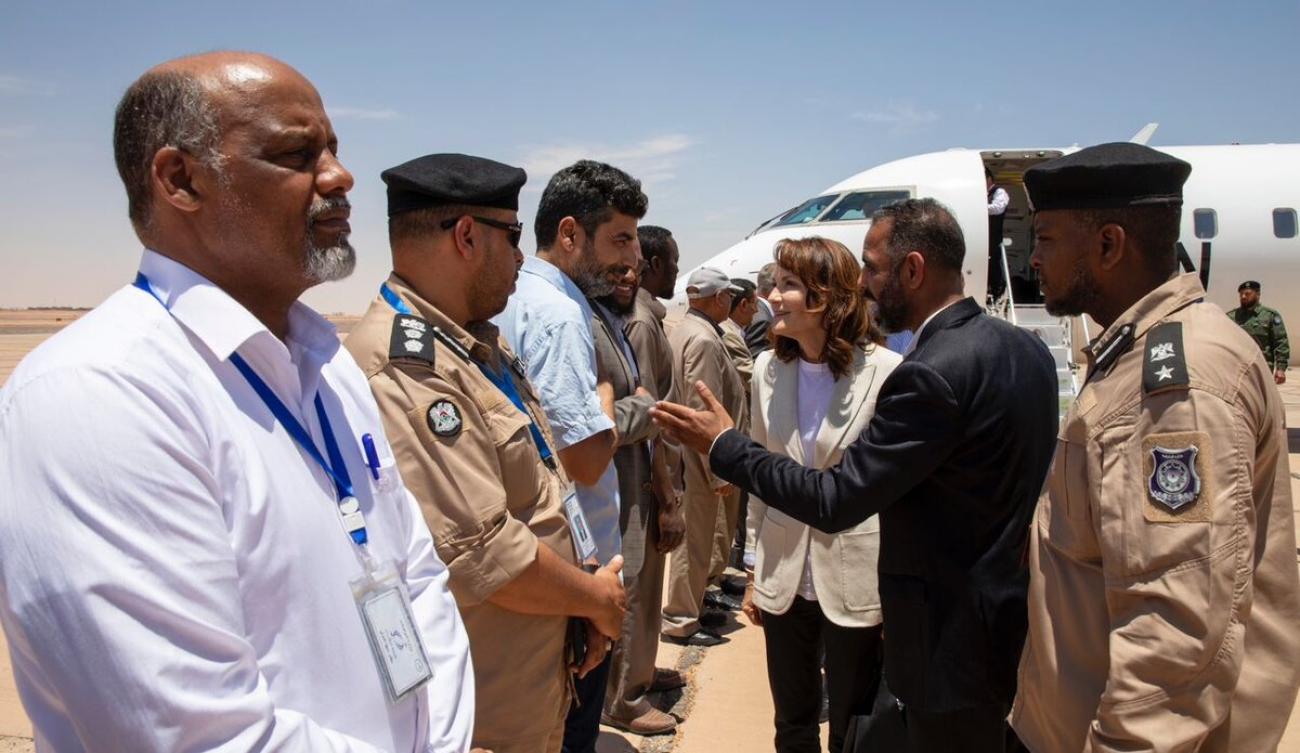This is the latest in a series of visits undertaken as part of the UN in Libya’s ongoing efforts in the region in line with the UN Sustainable Development Cooperation Framework 2023-25, which was developed with the government.
The UN delegation, which included representatives from the UN Development Programme (UNDP), UN Children’s Fund (UNICEF), World Food Programme (WFP), International Organization for Migration (IOM), UN High Commissioner for Refugees (UNHCR), UNSMIL Human Rights/Office of the High Commissioner for Human Rights and UNSMIL met with civil society and municipal leaders, including the mayors of Sebha, Qatron and Brak Al Shati and the Deputy Mayor of Ubari.
“We are very pleased to be in Sebha again today to continue our regular exchanges with municipal officials, civil society organizations, women, and youth to reinforce our commitment to people in the south and to discuss our ongoing and planned work on development and peacebuilding,” DSRSG Gagnon said.
Municipal leaders and civil society actors, during the discussions, highlighted their top priorities as restoring infrastructure, and improving access to basic services and employment opportunities. Peacebuilding is a cornerstone to achieve lasting development on the ground, they said.
DSRSG Gagnon emphasized that “The government has the main duty and responsibility toward people in the south and to invest in the south. The UN is committed to accompanying local authorities and to building capacities for sustainable peace and development in the region.”
The UN in Libya received in December 2022 a USD 5 million fund for activities in Ghat, Sebha and Ubari municipalities from the UN Secretary-General’s Peacebuilding Fund, the UN’s financial instrument of first resort to sustain peace in countries affected by violent conflict.
The new project, implemented by UNDP, IOM, WFP, and UNICEF in coordination with the government and civil society organizations, aims to establish peacebuilding committees in each municipality to identify conflict drivers, agree on priorities for action, and create and implement road maps. The project also seeks to boost economic opportunities for some 2,500 people, particularly youth. It is expected to directly engage 30,000 community members, largely through improved access to services.
UNDP with the Ministry of Local Governance has begun to mobilize the local peacebuilding committees. IOM and the Ministry of Labour have identified a vocational training center in Sebha to receive capacity building support. WFP plans to provide vocational skills training based on local job market needs through its Food for Training programme, and UNICEF will launch life skills training courses for teens at its youth centers and child friendly spaces.
The Peacebuilding Fund’s seed funding for the south also provides a coordination platform for the UN in Libya to build on a larger portfolio of work on the four strategic priorities of the UN Sustainable Development Cooperation Framework 2023-25: peace and governance, sustainable economic development, social and human capital development, and climate change, environment, and water.
During the visit to Sebha, the UN delegation saw recent renovations to Sebha’s main sewer lines that are improving sanitation and health conditions for more than 230,000 residents – completed through efforts of the Sebha municipality and UNDP.
“As you can see, the UN has increased its efforts and advocacy – to the government and international partners – to direct more attention and resources to people in the south,” Gagnon said. “We will continue to call for more support for the South to achieve the Sustainable Development Goals for all people in Libya.”









